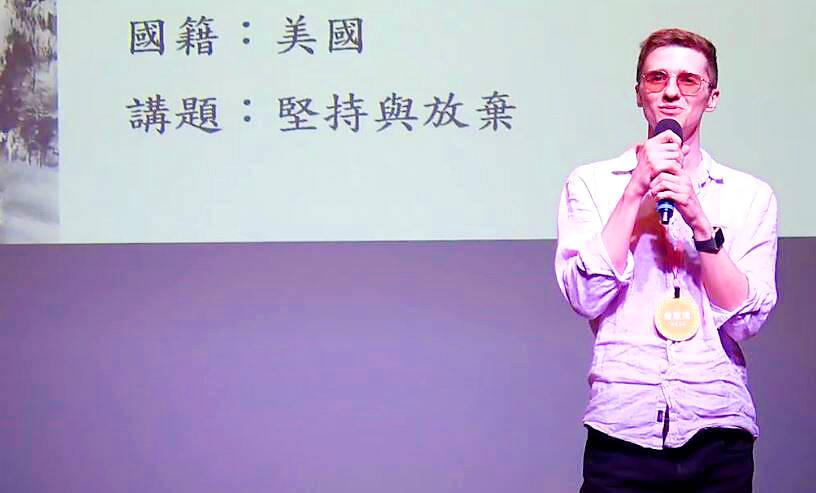American Caleb Foust on Tuesday won first prize at the Sun Yat-sen Memorial Hall’s annual Mandarin-speaking competition for foreign students.
Foust, a former engineer working in Silicon Valley, won the NT$20,000 top prize with his speech on “perseverance and abandonment,” in which he talked about his ambition to become a diplomat, the organizers said in a statement.
Foust said that he has applied in the US to be a diplomat seven times to no avail, but added that he believes he will realize his dream if he persists.

Photo: Screen grab from YouTube
He has aspired to be a diplomat since he was young and has been applying since he was 19, he told reporters.
“I will keep working until I become a diplomat,” he said.
Foust said that his former girlfriend was from Beijing, which started his fascination with Mandarin.
He visited Taiwan a few years ago and moved here to learn Mandarin here after being impressed with the people and the food, he said.
Americans John Kaltenbach and Camille Byrne were second and third, winning NT$16,000 and NT$12,000 respectively.
Peter Oortmann from the Netherlands was fourth, taking home NT$8,000.
Six people won Superior Prizes: Fathiya Adiba from Indonesia; Emily Darlene, John Kaulakis and Ethan Reiter from the US; Manowang Warunee from Thailand; and Arisa Yabuta from Japan. They received NT$6,000 each.
The contestants had the choice of five topics to speak on for five minutes: “Perseverance and abandonment,” “How to make good use of social media,” “My biggest worry in Taiwan,” “My viewpoint on Taiwan’s taboos” and “What age is the best in life?”
Peng Ni-se (彭妮絲), the head of the jury and a professor in Chung Yuan Christian University’s Department of Teaching Chinese as a Second Language, said in the statement that the speeches were excellent.
The contestants’ speaking cadences matched the content of their speeches, their pronunciation of Mandarin tones were done well and their postures added to the flow of the speeches, Peng said.
The contest aims to fulfill Republic of China founder Sun Yat-sen’s (孫逸仙) ideal of fraternity, as well as helping foreign nationals understand Taiwanese culture and share their own cultures, Sun Yat-sen Memorial Hall director-general Wang Lan-sheng (王蘭生) said in the statement.
The organizers would discuss the possibility of adding a Hoklo-language (commonly known as Taiwanese) category to the event to increase the diversity of the contest, Wang said.
Sixty people from 17 countries — each studying at a different university in Taiwan — participated this year, the statement said.

Chinese Nationalist Party (KMT) Chairman Eric Chu (朱立倫), spokeswoman Yang Chih-yu (楊智伃) and Legislator Hsieh Lung-chieh (謝龍介) would be summoned by police for questioning for leading an illegal assembly on Thursday evening last week, Minister of the Interior Liu Shyh-fang (劉世芳) said today. The three KMT officials led an assembly outside the Taipei City Prosecutors’ Office, a restricted area where public assembly is not allowed, protesting the questioning of several KMT staff and searches of KMT headquarters and offices in a recall petition forgery case. Chu, Yang and Hsieh are all suspected of contravening the Assembly and Parade Act (集會遊行法) by holding

PRAISE: Japanese visitor Takashi Kubota said the Taiwanese temple architecture images showcased in the AI Art Gallery were the most impressive displays he saw Taiwan does not have an official pavilion at the World Expo in Osaka, Japan, because of its diplomatic predicament, but the government-backed Tech World pavilion is drawing interest with its unique recreations of works by Taiwanese artists. The pavilion features an artificial intelligence (AI)-based art gallery showcasing works of famous Taiwanese artists from the Japanese colonial period using innovative technologies. Among its main simulated displays are Eastern gouache paintings by Chen Chin (陳進), Lin Yu-shan (林玉山) and Kuo Hsueh-hu (郭雪湖), who were the three young Taiwanese painters selected for the East Asian Painting exhibition in 1927. Gouache is a water-based

Taiwan would welcome the return of Honduras as a diplomatic ally if its next president decides to make such a move, Minister of Foreign Affairs Lin Chia-lung (林佳龍) said yesterday. “Of course, we would welcome Honduras if they want to restore diplomatic ties with Taiwan after their elections,” Lin said at a meeting of the legislature’s Foreign Affairs and National Defense Committee, when asked to comment on statements made by two of the three Honduran presidential candidates during the presidential campaign in the Central American country. Taiwan is paying close attention to the region as a whole in the wake of a

OFF-TARGET: More than 30,000 participants were expected to take part in the Games next month, but only 6,550 foreign and 19,400 Taiwanese athletes have registered Taipei city councilors yesterday blasted the organizers of next month’s World Masters Games over sudden timetable and venue changes, which they said have caused thousands of participants to back out of the international sporting event, among other organizational issues. They also cited visa delays and political interference by China as reasons many foreign athletes are requesting refunds for the event, to be held from May 17 to 30. Jointly organized by the Taipei and New Taipei City governments, the games have been rocked by numerous controversies since preparations began in 2020. Taipei City Councilor Lin Yen-feng (林延鳳) said yesterday that new measures by